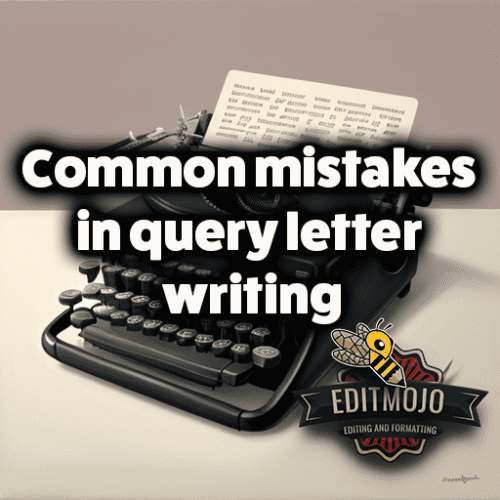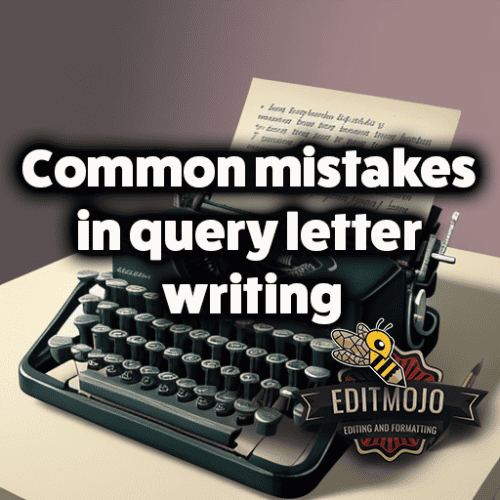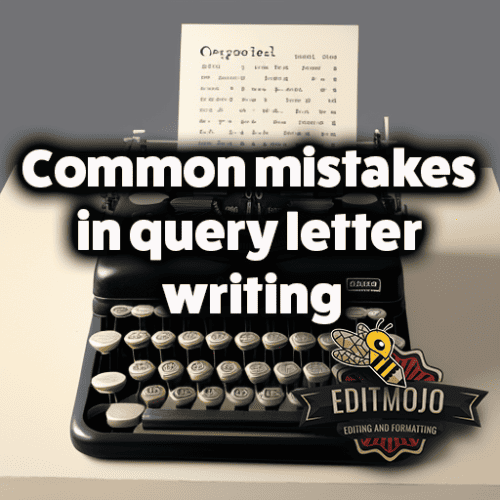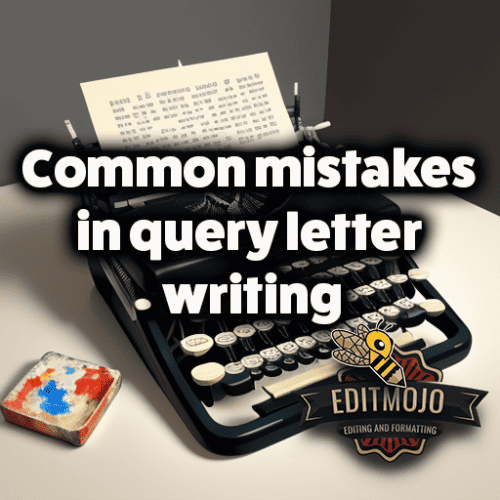Common mistakes in query letter writing
Common mistakes in query letter writing. Imagine standing on the edge of a bustling marketplace, hoping to pique the interest of passing strangers with a single, intriguing shout. That’s the equivalent of what writers do when they send out a query letter. A query letter is a one-page “pitch” that writers send to literary agents or publishers, hoping to hook their interest in a book project. The importance of a query letter is unparalleled in the publishing world—it’s your ticket to the big leagues, your foot in the door, your big chance! It is, however, fraught with common pitfalls that can turn this opportunity into a swift rejection. Let’s delve into what makes a great query letter and how to avoid common mistakes that could cost you the deal.
Key Takeaways
| Key Points | Takeaways |
|---|---|
| Importance of Query Letters | They are the first impression given to agents or publishers and can determine if your book gets a chance in the publishing world. |
| Anatomy of a Query Letter | A good query letter contains personalisation, a hook, a concise synopsis, and a relevant author’s bio. |
| Common Mistakes | These include lack of research, generic salutations, overselling or underselling your work, including irrelevant personal information, and not following guidelines. |
| Structural Errors | Poorly structured hooks, lengthy or vague synopsis, and overly complicated or confusing language. |
| Practical Tips | Personalize your letter, be honest about your work, keep it professional, and adhere to submission guidelines. |
Understanding the Anatomy of a Query Letter
A great query letter, like a winning recipe, has several key ingredients: personalisation, a hook, a concise synopsis, and a relevant author bio.
- Personalisation shows that you’ve done your homework. It proves you aren’t just sending a mass email but have specifically chosen the agent or publisher because they’re the right fit for your book.
- The hook is your one-liner, the attention-grabbing sentence that can make the reader want to know more.
- The synopsis gives a brief overview of your book’s plot. It’s your story boiled down to its essence, an appetizer that leaves the reader hungry for more.
- Your author’s bio should present you as a professional writer, mentioning any relevant writing experiences or credentials you have.
To see these elements in action, you can refer to successful query letters like this one that sold ‘The Art of Racing in the Rain’.

Common Mistakes in Query Letter Writing
Mistake #1: Lack of Research
Walt Disney once said, “The way to get started is to quit talking and begin doing.” When it comes to query letters, the ‘doing’ begins with research. Lack of research might lead you to pitch your gritty crime novel to an agent who specializes in romance novels, leading to a surefire rejection. Research the agent or publisher’s past work, preferences, submission guidelines, and any other pertinent details. Websites like Manuscript Wish List can be a gold mine of information in this regard.
Mistake #2: Generic Salutations
Imagine opening a letter addressed to “Dear Occupant” or “To Whom It May Concern”. Doesn’t create a warm, fuzzy feeling, does it? That’s how an agent feels when they open a query letter with a generic salutation. Find out who you’re sending your letter to, and use their name. It’s a small touch, but it can make a huge difference.
Mistake #3: Overselling or Underselling Your Work
Finding a balance in how you present your work can be a tricky business. Overconfidence can make you sound arrogant, while underselling can make your work seem unworthy. Present your work honestly, focusing on its strengths. Remember, your work’s value is inherent, and a well-crafted query letter is just the spotlight to bring that value to the forefront.
Mistake #4: Including Irrelevant Personal Information
Your author bio should be like a good trailer—exciting, interesting, and above all, relevant. Including your cat’s name or your passion for gardening—unless directly related to your book—can distract from your query’s main focus: your book. Stick to information that paints you as a skilled and professional writer.
Mistake #5: Not Adhering to Guidelines
Submission guidelines aren’t mere suggestions—they’re the rulebook to the game. Not following them signals disregard for the agent’s time and process. Make sure to follow them to the T. If the guidelines aren’t clear, don’t hesitate to contact the agent or publisher for clarification.

Common Structural Errors in Query Letters
Poorly Structured Hooks, Lengthy or Vague Synopsis, and Overly Complicated or Confusing Language can be the death knell for your query letter. Your hook should be punchy and exciting. Your synopsis should be concise yet comprehensive. And your language should be clear, avoiding industry jargon or overly complex phrasing.
Case Studies: Successful vs. Unsuccessful Query Letters
If we take the query letter for ‘Harry Potter and the Philosopher’s Stone’ as a successful example, we see a perfect balance of personalisation, hook, synopsis, and author bio. Everything is concise, relevant, and well-structured, enticing the reader to know more about the novel.
On the other hand, this analysis of an unsuccessful query letter shows how lack of personalisation, an unclear hook, and a confusing synopsis can lead to rejection.
Expert Advice on Query Letter Writing
For more insights, check out interviews with literary agents about what they look for in a query letter. Agents like Janet Reid and Jessica Faust have shared invaluable advice on their blogs. Also, don’t miss authors sharing their query process experiences in platforms like Writers Digest.
Common Misconceptions about Query Letters
One common misconception is that a good query letter can sell a mediocre book. Remember, your query letter is a reflection of your book, not a sales trick. Your book’s merit ultimately seals the deal.

Practical Tips for Effective Query Letter Writing
- Do Personalize: Research and address the agent by name.
- Don’t Oversell or Undersell: Be confident but honest about your work.
- Do Keep It Professional: Only include relevant personal information.
- Don’t Ignore Guidelines: Adherence shows your professionalism.
When in doubt, check your query letter against this list.
Conclusion (Common mistakes in query letter writing)
Like a lighthouse guiding ships through murky waters, a well-crafted query letter can navigate your book to the safe shores of a publishing contract. Avoid common pitfalls, be authentic, and let your passion shine through. And remember, every rejected query letter is a step closer to the one that gets accepted. So, keep writing, keep querying, and most importantly—keep dreaming.

References and Additional Resources
For more query letter advice, check out the following resources:
- Writer’s Digest Guide to Query Letters
- Query Shark Blog
- Agent Query Connect
- Getting Your Book Published for Dummies
Remember, practice makes perfect. With diligence, patience, and persistence, you’re sure to pen a query letter that gets a resounding, “Yes!”
Query Letter 1
Subject: Query: A Leap Into Shadows – Literary Fiction
Dear [Agent’s Name],
I am seeking representation for my novel, A Leap Into Shadows, a work of literary fiction complete at 85,000 words. It is a poignant exploration of resilience, empathy, and the impact of past traumas on one’s present, which may appeal to readers of Elizabeth Strout and Ann Patchett.
In A Leap Into Shadows, we journey with our protagonist, Jane, a successful lawyer burdened by her past. When a new case forces her to return to her hometown of Northridge, she must confront the shadows she’s been running from – a turbulent childhood and the loss of her best friend under mysterious circumstances. The story unfolds as Jane peels back layers of her past, encountering old friends and forgotten memories. It culminates in a cathartic reckoning of her own narrative, prompting readers to question the impact of their own past on their present.
I hold an MFA in Creative Writing from The University of Iowa, and my short stories have been published in Ploughshares and The New Yorker. I also received the Pushcart Prize in 2021.
Thank you for considering my work. I would be thrilled to send you the completed manuscript or any additional information you may need.
Best,
[Your Name]
Query Letter 2
Subject: Query: Starstorm – YA Sci-Fi Adventure
Dear [Agent’s Name],
I’m writing to you to seek representation for Starstorm, a 75,000-word Young Adult Sci-Fi Adventure novel. This story combines the thrilling space exploration of Becky Chambers’ novels with the emotional depth and character relationships reminiscent of Amie Kaufman and Jay Kristoff’s Illuminae series.
Starstorm follows a group of teenage misfits who embark on a quest across the galaxy to stop a cosmic cataclysm. Told from multiple perspectives, this story is full of diverse characters, each battling their personal demons while attempting to save the universe. Among them is our protagonist, Kayla, a gifted pilot with a tragic past, who discovers newfound purpose and friendship amidst the chaos.
I have a degree in Astrophysics from the California Institute of Technology, which has helped me imbue this tale with a sense of scientific authenticity. My short stories have been published in Asimov’s Science Fiction and Lightspeed Magazine.
Thank you for considering my submission. I am eager to send the completed manuscript or any further material upon your request.
Best Regards,
[Your Name]
Query Letter 3
Subject: Query: My Journey to Here – Inspirational Memoir
Dear [Agent’s Name],
I am seeking representation for my memoir, My Journey to Here, complete at 65,000 words. It is an uplifting and emotionally charged narrative in the vein of Cheryl Strayed’s Wild and Elizabeth Gilbert’s Eat, Pray, Love, chronicling my transformative journey through adversity to self-discovery.
My Journey to Here takes readers on an intimate journey from my humble beginnings in rural Nebraska to my ambitious pursuit of a career in Manhattan’s high-stakes world of finance. The sudden loss of my job during the 2008 financial crisis led to an unplanned backpacking trip across Europe, where I learned life-altering lessons about resilience, humility, and the beauty of shared experiences.
In addition to my personal journey, my work as a motivational speaker for the past seven years has connected me with audiences worldwide. I believe this memoir, like my speeches, will inspire and encourage readers to see adversities as opportunities for growth.
Thank you for considering my work. I’m excited at the prospect of sharing the completed manuscript or any additional material you may require.
Sincerely,
[Your Name]
Top Five Questions and Answers
| Questions | Answers |
|---|---|
| What is a query letter? | A query letter is a one-page pitch that writers send to literary agents or publishers, hoping to spark their interest in a book project. |
| Why is it important to avoid generic salutations? | Generic salutations can make your letter seem impersonal and mass-produced, reducing your chances of catching an agent or publisher’s interest. |
| How can I avoid overselling or underselling my work? | Present your work confidently but honestly, focusing on its strengths and unique selling points. |
| Why should I stick to submission guidelines? | Not following submission guidelines can lead to your query letter being disregarded, as it shows disrespect for the agent or publisher’s process. |
| What should I include in my author bio? | Your author bio should include any relevant writing experiences or credentials, presented in a professional manner. |
